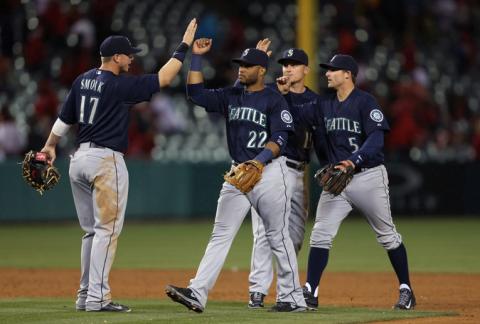Cano's Fresh Start
The New York Times
April 11, 2014
By Doug Glanville
The baseball experience of my childhood led me to believe in the stability of the baseball family. Even though free agency was alive and well in those years, my favorite players were mainstays. Mike Schmidt, Steve Carlton and Garry Maddox were Philadelphia Phillies legends who showed me that once you are granted the golden ticket to play professional baseball, you can enjoy a long career and be identified mainly with one team.
That ticket was the ultimate symbol of loyalty, a two-way street that ends up teaching us about the power of exercising the option to stay home. Keep it in the family, and we all can be Derek Jeter and, better yet, we can even exit like Derek Jeter (or Mariano Rivera before him), with a stadium-by-stadium retirement tour. (Well …. at least in New York.) Jeter, like others who played extensive time with one team, used social media to tell fans of his retirement, setting the stage to one day polish his championship rings, back a truck full of memorabilia into his garage and wait for the Hall of Fame to call. All of which was or will be achieved while wearing a New York Yankee cap.
Robinson Cano was given that option and declined it. In the second week of play of the new season, there are no signs he will ever be welcomed back to New York. On Opening Day in Anaheim, the new Seattle Mariner heard the boos cascading down on him from whatever Yankees fans were present. He had chosen the dollars of “respect” in Seattle, signing a contract that takes him out to 2024, by which point his New York days will either be forgotten, or remembered bitterly, by some Yankee fans. He had the opportunity to win on an annual basis, to be paid handsomely in New York and, maybe most important to Yankees fans, to be a lifelong Yankee.
But life is short in baseball and Cano is now 31 years old — the age when a player graduates from learning about a legacy to passing one down. It is the pivot point when a player still has the physical prowess to dominate the game, coupled with the awareness that he cannot just roll out of bed and do so. You have to be fully engaged, fully prepared, and be able to relate both to the members of the team who represent the game’s future and those — like coaches — who represent its past. It is no longer just a game, it is an heirloom profession held together by the strings of your hamstring tendons or the length of your guaranteed contract.
Cano grew up under the canopy of the Yankees mother ship, and the greatness of Jeter, Rivera and the long list of legends that represent its history. He knew he still had to put in substantially more productive time to get into that club. That, even though he had been one of the best at his position for nearly a decade, he needed to do more. New York is an ego-check that keeps checking.
I saw Cano on Opening Day this season, in Anaheim. I asked him about his new team and to confirm what I read about his newfound “leadership.” I had heard rave reviews of his contribution to the Mariners during spring training, and when I prompted him about it he said, “Just doing for these guys what people did for me.”
I can feel the collective eye roll of New York as I put the period on that quote, given how commonplace the criticisms of his lack of on-field hustle had become in New York, but it is worth noting that Cano is enjoying a rebirth that happens to some players who play long enough. He has found a moment when he can truly teach and lead. In Seattle, even veterans are looking to him because it has been so long since they had a consistent winning culture.
His number one protégé is Justin Smoak — a young player who gives you the sense that he has played forever, but just short of his potential. Critics wonder when he will put it all together. He has power, he switch-hits, he can field, he has a good sense of the strike zone. Cano won him over from the start, and he made it clear to Smoak that he would be demanding more from him.
Republished from NYTimes.com
Photo Credit: Jeff Gross/Getty Images






